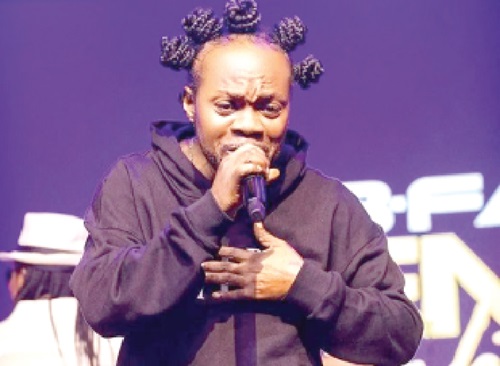On Saturday morning, the news trickled in as a mere rumour, but that was easy to dismiss because we had been down the road of false news before, not just regarding him but other public figures.
Eventually, the whispers and the hesitation assumed more of a structure, and then some credibility.
Then came confirmation. Then social media went into overdrive. Yes, it was true. Daddy Lumba was gone.
As the day wore on and the news spread like a harmattan bush fire, it appeared everyone had caught the fever of his songs.
Radio and television stations, people in private homes, drivers in private and commercial vehicles, bars all seemed to be responding to an order to project the legend in tribute, and yet it was as spontaneous as it was almost infectious.
Brief encounters
I first encountered DL, as many affectionately call him, somewhere in the mid-1990s in London’s Brixton Academy, where he was performing.
It was quite a magical event, and I remember clearly how literally everyone sprang to their feet when his hit song Mereye aka akwantuo mu came through.
After all, this was an immigrant crowd.
I had relocated to the UK just a couple of years or so earlier.
This song, which speaks to the struggles of immigrants in Europe and North America, meant much more to me over the years for fairly obvious reasons.
My second encounter was much more personal, back in 2018, when I worked at the Ministry of Education.
I bumped into him at the Ministry reception area, went up to him, declared myself a top fan of his and requested a photograph.
He obliged with a hearty smile.
It remains one of my most treasured photographs.
Something for every situation
In a musical career spanning over 30 years, with 34 albums and over 200 songs to his credit, DL’s appeal lies beyond the amazing rhythms and beats of his music, which could rock you and stir your soul in its own right and bring you to the dance floor or at least nod in appreciation, whatever the occasion.
His command over the Asante Twi language was deep and masterly, laced with proverbs and wise sayings, whatever the issue he was addressing.
Sometimes it was difficult to grasp every single word that he was uttering. But his songs articulated both our collective and individual thoughts, fears, hopes and aspirations.
The issues he raised applied to all, no matter one’s educational, financial or social standing.
Whatever the mood that caught you, DL had something in his repertoire for you.
On the realities of financial security, for instance, he gave us Sika Asem, Ohia Asem and Sika. For romantic love, Se Sumye Kasa, Odo Nti, Medo w’asem Bebree, and others beckoned.
If he wanted to push boundaries on the love front into the sexually suggestive realms, Tokuro Mu, Enko Den, Awooso and Bubra came to the rescue.
The lyrics and language were couched in a manner devoid of coarseness or vulgarity, so that even the devoutly righteous would shake their head only in amusement.
Of course, for good measure, as if in penance, he threw in some gospel hits, including Mesom Jesus, Enye Nyame Den and Yesu Ka Yen Ho.
Theresa and Asante Nkae spoke to gratitude, Ye Ne Wo Sere Kwa to hypocrisy and Yentie Obiaa to the need to live your life and ignore naysayers.
He was also a master of the art of innuendo (what Akans call akutia). Obi Ate Me So Buor, Mpempem, Biribi Gyegye Wo, Taaso Eburu and Sesee wo se spoke to this.
Ultimate message
The ultimate certainty of our lives is death.
DL did not shy away from this in his songs on this subject, which are popular at Ghanaian funerals both at home and abroad.
He spoke about his death many times, a testament to his courage in confronting the inevitable.
He wrote several tributes to himself, a remarkable display of self-awareness.
Akwanoma, released in 1990, was a profound reflection on life's journey for us all.
Yemfa Odo was released in 1991, Makra Mo in 1992, a trilogy that showcased his growth and wisdom.
When he released Adaka Teaa in 2003, over 20 years ago, he was reminding us of the importance of living in the present.
In the prime of his life, Charles Kwadwo Fosu essentially envisioned that this day would come, and he said his goodbyes.
In boldly addressing the rather touchy subject of death several times over at that age, a subject many pointedly avoid, he aptly captured the essence of Julius Caesar’s assertion in William Shakespeare’s Julius Caesar thus; ‘Cowards die many times before their deaths.
The valiant never taste of death but once. Of all the wonders that I yet have heard, it seems to me most strange that men should fear, seeing that death, a necessary end, will come when it will come.
Legacy
With his hit Nana Ye Winner, which he composed for the NPP ahead of the 2012 elections, he literally threw himself into the political lions’ den but came out unscathed, with his fan base remaining intact.
In a country polarised by partisan politics where an artist could easily alienate a chunk of his fan base by openly identifying with one party or the other, this was a rather remarkable testament to his stature and broad appeal.
Perhaps DL’s biggest legacy to us is a solemn reminder that music, beyond entertainment, can also be philosophy, redemption and hope on a bed of rhythms and beats, and that whilst it inspires deft footwork on the dance floor, it must also feed and enrich our minds.
Perhaps our young musicians need to reflect on this the most. Rest well, Charles Kwadwo Fosu, son of Ama Saah.
Rodney Nkrumah-Boateng.
E-mail: rodboat@yahoo.com

